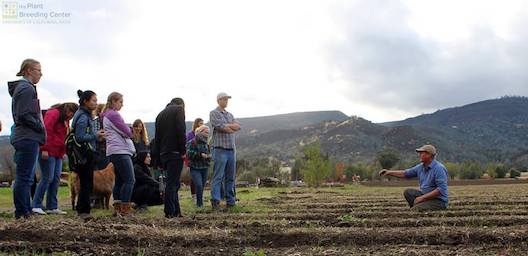Today’s Indian Summer Sunday was delightful here on the farm. The morning started with a slight frost and a haze drifted over the valley creating a crisp chill to the air all day long. Grape, pomegranate, pear, and walnut leaves are turning gold, reds or brown, falling to blanket the ground with a carpet of mulch. The light frost signals that a year has turned. Crops have been harvested and stored. We have put aside an abundant harvest of winter squash, dried flowers, peaches, tomatoes, apricots, walnuts, grains, jams, sauces, oils, and seeds. In the age-old rhythm of seasons and farm, this crisp morning marks an end, the turning of fields to rest and the slow metabolism of low sun and colder days. It is so welcome here.
The prediction has been for rain to fall through the coming week, so after breakfast, household responsibilities needed attention—scrubbing the chimney of last year’s soot, and cleaning gutters. Then a couple of unfinished fields called to be planted ahead of the rain. Each year, planting cover crops and wheat with our grain drill is an enjoyable pre Thanksgiving activity that marks our slowing down. In this time we plant rain fed crops that thrive in the cold weather. We also put the farm to rest in the closing of a year.
So after chores, we fired up the seed cleaner and ran some of last year’s Senatori Capelli and Frassinetto wheat seed. Cleaned up, we filled the hopper on the grain drill and planted about 25 acres before dusk. These two varieties are older Italian landrace types that are preferred in Italy for their flavor and their use in pasta. In our continuing exploration of flavor, we are reaching back to some older varieties that may not yield as well, but offer other benefits. These two wheats represent a gift of seed linking us to generations of seed savers, bread bakers, pasta chefs and to the many farmers past who cast their seed to the soil on crisp cool fall days.
This time of year, we keep our eye on the weather reports because rain will determine what we can do in the fields. Too much rain might close the door on winter grains because soil can be too wet to plant. On the other hand, to plant too early might mean that a small rain would germinate the planted seeds and if they don’t receive additional rain after germination, they may wither and die. Today, Sunday planting ahead of an approaching rainfall allows for a more peaceful sleep on Sunday night.
The soil this morning was perfect. Its moist looseness was created by a good start to this year’s rainy season. All of our fall/winter crops have been thriving with the few storms that we have had this past month. We are nearly finished with planting our winter hardy crops. Except for a bit of lettuce and some spinach, planters will go into the barn soon to be retired until early February when we will start the annual cycle of planting all over again.
Over the 35 years of Full Belly we have developed our own slow unfolding rhythm of a year: asparagus and greens, tomatoes and melons, potatoes and flowers, peaches and almonds, plus so much more. This is our annual trek. Every year is a long passage where this time of fall retreat and renewal is anticipated and is never long enough. Each year, come January, we are challenged to do it again, to get it better and to make it a creative journey.
Full Belly operates with much for which we are grateful. We feel a reverence for the miracles that unfold each day – soil’s funkiness, humming insects, hard charging grandchildren, thoughtful partners, dedicated crew, and for the many gifts that this generous land gives to us. Thanksgiving is a special day to remember that we are the beneficiaries of the work, sweat and songs of so many who have come before us and added their hands to the collective good, We take a moment to show our gratitude to our ancestors, to all who have saved seed, worked to create food security, made the roads, argued for the laws, wrote the written word or built the pieces that make our lives so abundant.
We have been sustained this year by incredible fertility and the bounty that work and faithfulness can yield. As we receive these gifts, we would be wise to share, to be grateful, to remember our friends who have suffered fire or flood, and to extend a hand to raise them up. The gifts of field and good land are best given again and again with love and gratitude. Thanksgiving is a day to both say grace and be in a state of grace. May your meal be delicious. Thank you for being a part of our journey.
–Paul Muller

